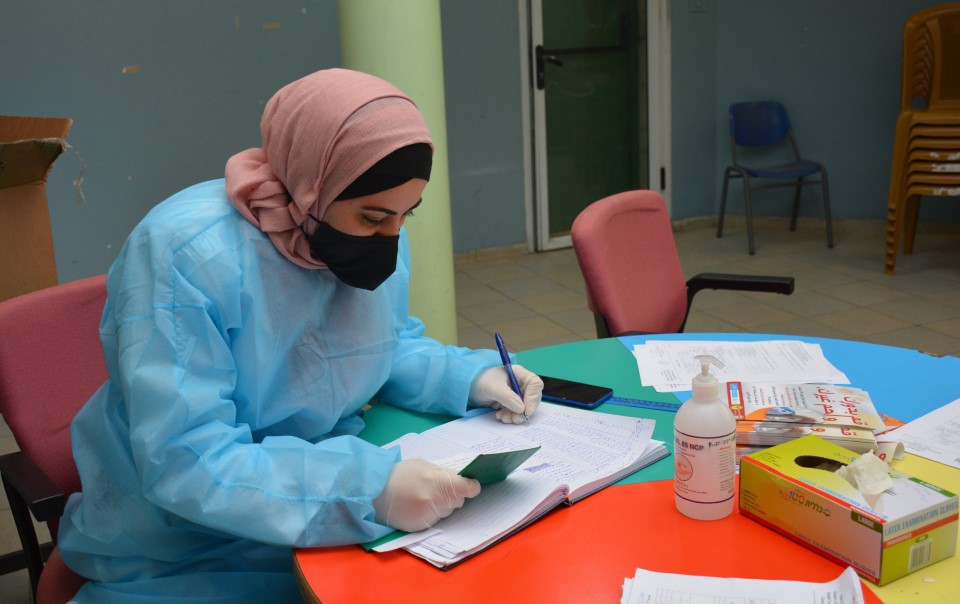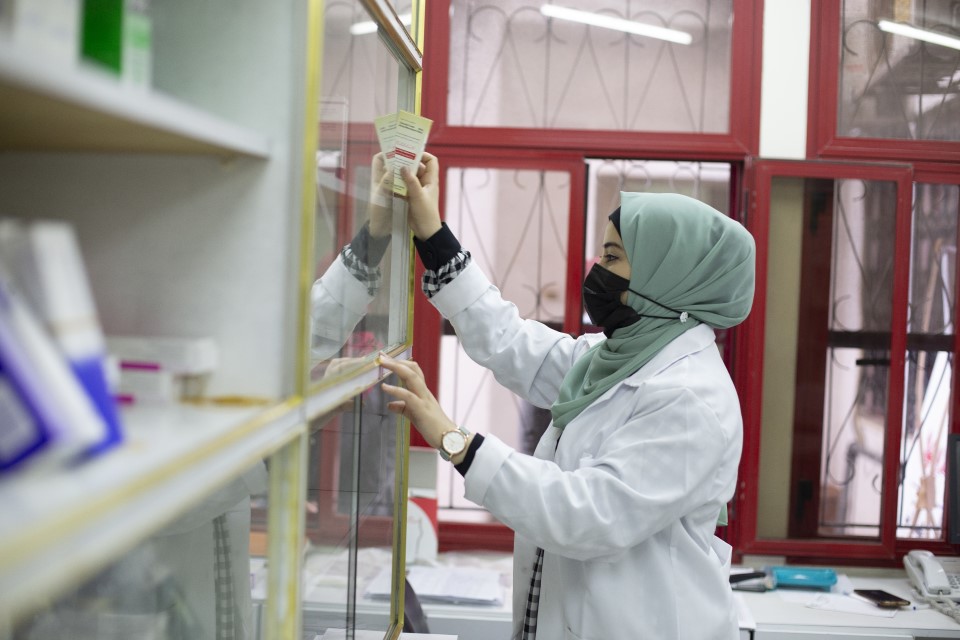Two birds with one stone: UN Women helps vulnerable women find jobs in the battle against COVID-19
Date:

Leila Saleh receives training at a COVID-19 vaccination centre in Nablus, the West Bank. Photo: Juzoor
Along with 60 unemployed nurses, Rana took part in a UN Women-supported project that aims to reinforce women’s leadership and participation in emergency response, including COVID-19, and equitable recovery. This project is part of a larger programme on “Advancing the Women, Peace and Security (WPS) agenda in Palestine.” Generously funded by Norway, this project aims at supporting the Palestinian institutions and civil society in implementing a National Action Plan (NAP) on UN Security Council Resolution 1325, and increasing women’s participation in emergency response and post-conflict recovery. NAPs can be critical tools in the battle against COVID-19. For example, a UN Women analysis found that almost half of Palestine’s first NAP to be in line with the UN framework for the immediate socio-economic response to COVID-19.
The project has increased the employability of young women who have recently graduated from nursing schools to ultimately find jobs at health facilities in marginalized areas severely affected by COVID-19.
“Whereas at university our learning was more theoretical, this training focused on practical learning and tasks,” says 25-year-old Hanadi* with a bachelor’s degree in nursing from a Gazan university. “It also increased my professional experience and increased my abilities and knowledge of work environment. Now I feel more qualified to apply for jobs.”
Implemented by partners in the West Bank and Gaza, Juzoor and the Palestinian Centre for Democracy and Conflict Resolution (PCDCR) respectively, the capacity building includes medical and non-medical skills as well as skills designed to help young graduates navigate the job market and application process and gain on-the-job experience through internships. To ensure the training responds to the needs of the health sector and patients, UN Women’s partners held talks with potential employers and officials at the Ministry of Health in Ramallah. Their feedback informed the design of trainings to maximize the trainees’ chances of being hired.
“The project will be a replicable model to continue supporting women and engage them in recovery efforts,” says Dr. Umayah Khammash, Director of Juzoor. “Supporting new generations of unemployed women graduates with economic opportunities will eventually lead to their deployment to the health sector at a time when they are really needed.”

Areej Al Nahal, pharmacist, also took the nursing training in Gaza. Photo: Palestinian Centre for Democracy and Conflict Resolution
“As interns, we get real experience and deal with real cases as if we were employees. Now we have a lot of knowledge so when we get hired, we hit the ground running,” says 21-old-year Samah* from the West Bank. “For example, we have also learned about the importance of data collection to combat the pandemic. We were also sent to screening centres to see how samples were taken.”
According to the Palestinian Central Bureau of Statistics, seven out of ten Palestinian men are in the labour force, and only two out of ten women are currently working. Youth in general, and women in particular struggle to find jobs after graduation.
COVID-19 has burdened an already depleted and fragile health system, which was suffering from a widespread shortage of resources, and human resources in particular. A study conducted by Palestine Economic Policy Research Institute in 2018 found that there was a significant shortage of nurses. Due to COVID-19 measures and restrictions, health workers who have been in contact with COVID-19 patients need to quarantine at home after their exposure, aggravating the shortage in the health workforce. Some of the project’s trainees filled in for them.
“I have gained a lot of experience through my internships. I also filled in for nurses who were in quarantine. I have learned a lot about how to deal with patients while taking precautionary measures to protect myself and others and I tried to spread this knowledge around me,” says 20-year-old Jumana* from Jenin (West Bank) who was part of the group.
While most of the health workers on the frontlines are women, their voices are rarely heard in decision-making. The training provided participants with the opportunity to learn about the importance of women’s participation in decision-making so that they can shape decisions that benefit the whole society, men and women.
“Decisions are sometimes made by men only without consulting women. But women have a role too,” says 26-year-old Samah* from Gaza with a diploma in nursing. “One of the most important things I leaned during the training, especially as a Palestinian who lives under the occupation, is the importance of women’s political and economic participation. This training has motivated me to learn more about women's positive contribution to peacebuilding and conflict resolution.”
“Gender equality and women’s empowerment are not only essential for the full attainment of women’s economic rights but also for tackling crises such as the COVID-19 pandemic,” says Saeed Al Maqadma, Director of PCDCR. “This project has contributed to increasing job opportunities for women and girls and enhanced their ability to help manage the pandemic.”
“In Palestine, like elsewhere, women health workers make up the majority of the first responders to the pandemic,” says Ms. Maryse Guimond, UN Women Special Representative for Palestine. “To effectively respond to the pandemic and recover from it without leaving anyone behind, we also need to ensure that their indispensable contribution on the ground is equally reflected in decision-making.”
*Name changed to protect survivor privacy and confidentiality.